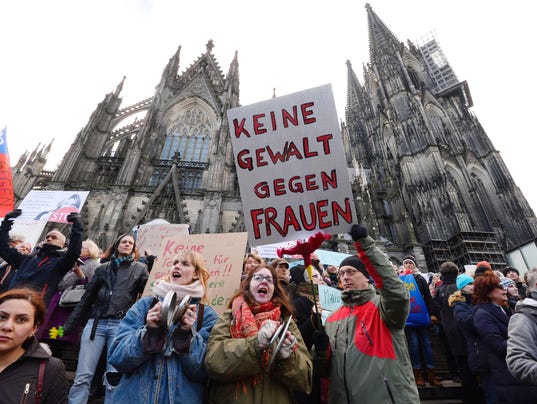Germany's Colossal Headache
"The state of leadership in Europe is such that the future of the E.U. currently rests on Merkel's strength, or weakness. Last year, we thought Europe could unravel over the euro. Now, it could be border security."
Constanze Stelenmuller, fellow, Brookings Institution, Washington
"Limiting numbers is not in itself unethical; it helps to maintain acceptance in society."
"If democrats refuse to talk about limits, they leave the field to populists and xenophobes."
Joachim Gauck, German President
 |
| Syrian Refugee Protesters in Cologne holding signs condemning racism and sexism (Picture: EPA) |
In mid-February, the EU leaders will convene their next summit meeting. On the agenda is the problem related to Britain possibly abandoning the bloc, but Jean-Claude Juncker, European Commission president, is anxious for the leaders to prepare to devote quality time to the issue of refugees flooding Europe. As though EU leaders require reminding that the issue should be uppermost in mind.
The immutable surge of refugees emanating as a result of conflicts in Iraq, Syria and Afghanistan is not expected to end any time soon. Spring is not far off and with it there will be a renewed surge of refugees and migrants anxious to see whether Chancellor Merkel's heart is still as authentically humanitarian as recent events have convinced them it is, claims that all those who have entered Germany in the past months will return once conflict subsides, aside.
Germany has clout, representing the most hale and strongest economy in the 28-nation bloc. Throughout the economic crisis that fixated the EU for years before the incursion of desperate refugees seeking a new and decent future for themselves, fleeing the carnage of sectarian war and national dysfunction, exploitation and poverty, it was Germany's steady hand and Mrs. Merkel's common sense that kept the union afloat.
But she and her nation now find themselves in the midst of a dilemma; how to convince Germans already seeing their culture, their social mores, their religion, their laws engulfed by a panorama of foreign cultures and ethnic social habits and religious strictures and laws that clash with their own, that an additional huge influx of the same will not imperil all they hold dear as Germans and Europeans, catering the immediate needs of refugees who will later demand ultra entitlements.
Mrs. Merkel not so long ago admired for her stance on generous refugee acceptance is now reviled by the very people who supported her then as they see stark evidence of what in the dark corners of their minds they worried might occur. Chancellor Merkel has relented, transposing her original open arms to a partially closed embrace that is limit-setting. Ultimately broadening to one that resolves haven-seekers must, at the appropriate time, prepare to return to their countries of origin.
It didn't work for the Turkish workforce that Germany brought in at a time of need to do work that Germans didn't want to perform themselves, and it won't work now, because many migrants, fearing just such impositions on their future plans to advance themselves in Germany, have gone under cover, disappeared from view, biding their time and their futures. The open borders that the EU cherished for its free movement is now irredeemably threatened.
Much in Europe, however, is now threatened, and Mrs. Merkel no less so, politically because of the anger and rebellion her decisions have aroused in a Germany accustomed to orderly politics. Austria once in lock-step with Germany over the refugees now has set a migrant cap, displeasing Mrs. Merkel who refuses to set a similar cap despite German lawmakers urging her to do just that.
 |
A
man holds up a sign reading "No violence against women" as he takes
part in a demonstration in front of the cathedral in Cologne, western
Germany.(Photo: AFP/Getty Images)
|
The surge of refugees from Iraq, Syria, Afghanistan, Somalia, Libya and Eritrea has stretched Germany's capacity to absorb them to the limits. West Germany experienced something similar with reunification with East Germany, and it took years and billions of investment to restore unity between the two halves. In the instance of the refugees flooding Germany there will never be unity between two such disparate cultures, heritages, and religious values.
Labels: Conflict, European Union, Germany, Migrants, Refugees

<< Home